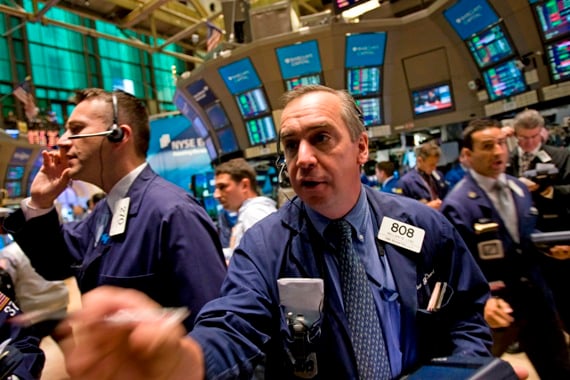U.S. investors who sold equities in their retirement accounts during market volatility in 2008 and 2009 did worse than those who stayed in stocks,
Fidelity Investments said.
Participants in 401(k) savings plans who dumped stocks from Oct. 1, 2008, to March 31, 2009, when the Standard & Poor's 500 Index fell 31 percent, and hadn't returned to equities as of June 30, 2011, had an average account balance increase of 2 percent, according to the study released today. Those who maintained some equity allocation during that period saw their balances rise 50 percent on average.
“Staying the course does prove to be an effective strategy in the long term,” said Beth McHugh, vice president of market insights for the Boston-based mutual-fund company. “Any move can have a dramatic long-term effect.”
Fidelity, the largest provider of employer-sponsored 401(k) plans, based its data on 7.1 million worker accounts. About 117,000 participants sold all their equities between October 2008 and March 2009, McHugh said. About half of them hadn't reinvested in stocks as of the end of the second quarter this year, she said. From March 31, 2009, through June 30, the S&P 500 gained about 66 percent, according to Bloomberg data.
The average balance of
Fidelity's 401(k) plans was $75,200 as of June 30, compared with $74,900 at the end of the first quarter, the company said.
Money Transfers
The study may hold lessons for savers during the current market turmoil. Participants in 401(k)s transferred almost 1 percent of assets this month, or about $1.2 billion, mainly from equities to fixed income, according to an index that tracks daily transfers in some 401(k) plans administered by Aon Hewitt.
The Dow Jones Industrial Average fell 6 percent from Aug. 1 through Aug. 17. Stocks declined in response to Standard & Poor's downgrade of the nation's credit rating and concern that the U.S. economy may lapse into another recession.
Aon Hewitt's index, which represents 1.5 million workers and $123 billion in assets, reported its fifth-highest trading volume on Aug. 8. That day the S&P 500 plunged 6.7 percent, its biggest slump since December 2008.
The amount of funds transferred is “significant” given that it was only a two-week time period, said Pamela Hess, director of retirement research for Aon Hewitt, a unit of Chicago-based Aon Corp. (AON) During the financial crisis in 2008 through the first quarter of 2009, about 6 percent of 401(k) assets moved out of stocks, Hess said.
No Rush
Participants had an average of 67 percent in equities before the market decline in 2008, said Hess. This month the average equity allocation is 58 percent, she said.
“Plan participants aren't rushing to jump out of, or into, the stock market,” Steve Utkus, director of Vanguard Group Inc.'s Center for Retirement Research, said in an Aug. 12 report. “The percentage of participants actually moving money remains small.”
Two percent of Vanguard 401(k) participants executed a trade in the first eight trading days of August, the report said. Vanguard has more than 3 million participants in more than 2,000 plans, according to the Valley Forge, Pennsylvania-based mutual-fund company.
Investors should be aware that they'll get end-of-day pricing when moving money in their 401(k)s while the market is open, Hess said. People often sell at the bottom and if they buy back stocks at all it's after the market rallies, she said.
“Timing the market doesn't work,” Hess said. “If it did people would be on the beach somewhere.”
--Bloomberg News--







